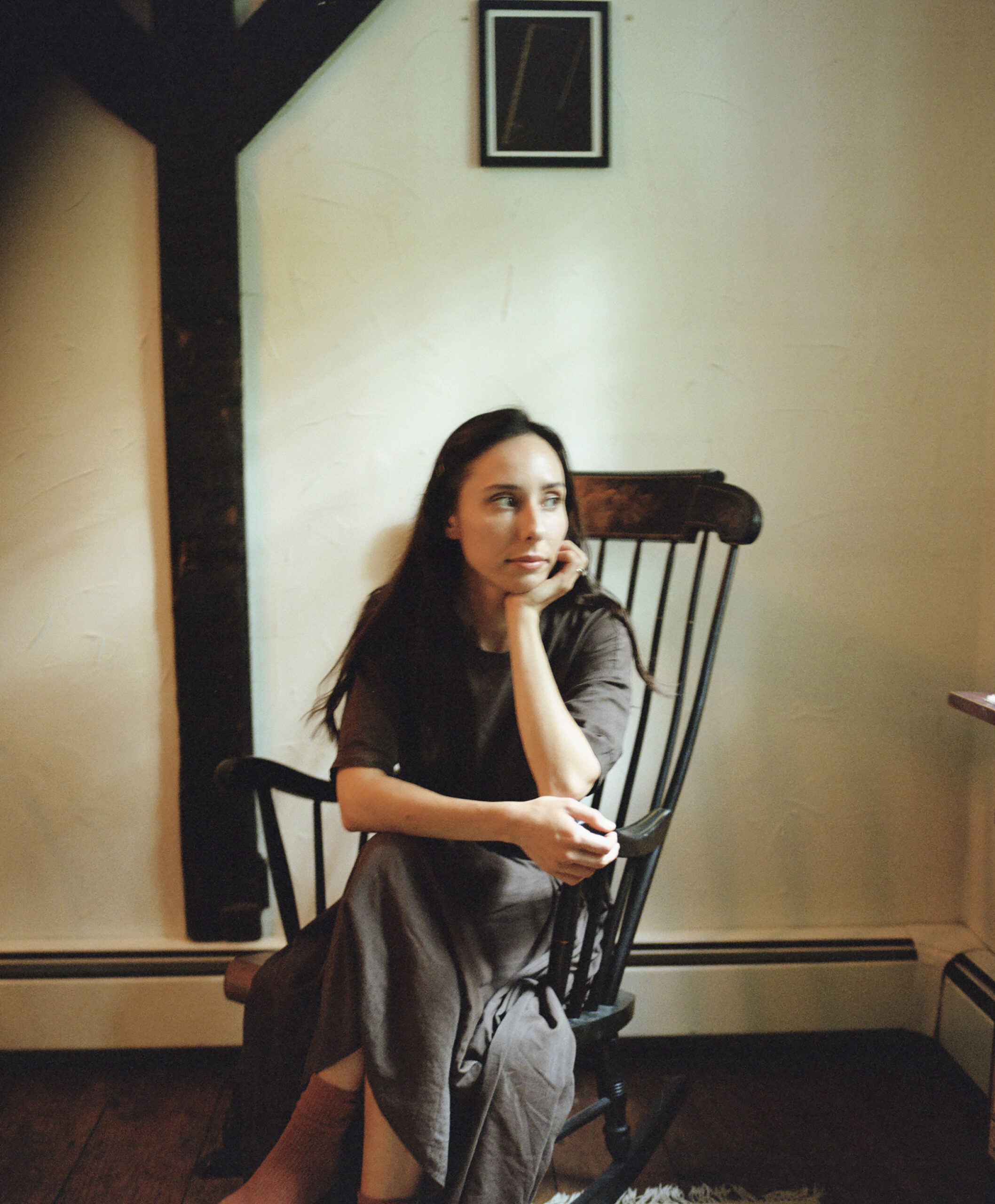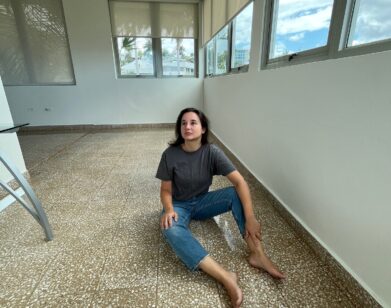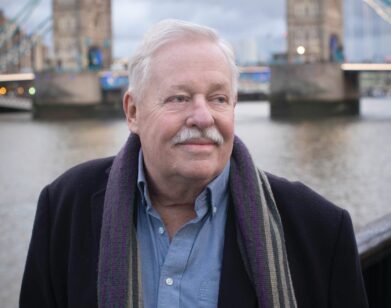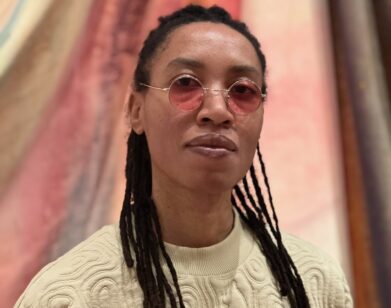LIT
Nicolette Polek Found God in a Dilapidated Opera House
Nicolette Polek’s long-awaited novel Bitter Water Opera is a sensuous banquet that ravishes while leaving you hungry for more. From the smell of ambergris and the taste of French peach pie, to the site of a dilapidated opera house in the process of being resurrected in the barren plains of the Death Valley desert, its glow makes the reader wish it lasted longer, just as it slips through your fingers.
It is a novel of paradoxes: a story of shame and healing, of failure and hope, where “serenity and purgatory share the same face,” as Polek writes, and the tedious, humdrum details of daily life become a source of enchantment and wonder. Polek has managed to write a religious novel–one that rejects facile platitudes and kitsch, instead opting to weave the thread of things eternal into the fabric of the story, rendering it relatable to both believers and skeptics.
Last month, I accepted Polek’s invitation to meet at her cottage in the woods of upstate New York, whose otherworldly aura brought the novel’s ethereal glow to life. She and her husband Jordan Castro welcomed me with lavender tea, penne vodka, and a Palm Sunday cross, the kind one uses to adorn one’s lawn or the grave of a loved one. Apropos of nothing in particular, the speaker system played opera in the background. We went on to tour the surrounding woods while dragging on American Spirits and watching their two dogs sniff the wild vegetables and chase each other across a small footbridge over a brook. After wiping the mud off our shoes, we sat down to discuss her latest book.
———
STEPHEN G. ADUBATO: So, Bitter Water Opera is your second novel?
NICOLETTE POLEK: It’s my second book. My first book was a short story collection.
ADUBATO: Why a novel, then?
POLEK: I think I wanted to write a novel to begin with. With this novel, I had maybe three intentions. The first was that I wanted to write a novel about female despair that wasn’t the novels of female despair that we see. A lot of contemporary millennial novels depict a kind of female character that’s consumed by despair, but not consumed by an answer for it. And then in 2016, I became a Christian, so a lot of the things I wanted to write about changed. I wanted to write a novel that depicts the interiority or consciousness of the decision of stepping towards God. Then, when I was in my MFA, I was taking a road trip home on break and I downloaded an app called Roadside America. Have you heard of it?
ADUBATO: It sounds familiar.
POLEK: Yeah, it’s very similar to Atlas Obscura, which is a database of unique and less-traveled landmarks, but it’s a little bit more community-run. I was just looking through the themes of the landmarks and two of them were women and spirituality, and that’s how I found Marta Becket’s [Amargosa] Opera House.
ADUBATO: I see.
POLEK: I was really struck by the pictures of Marta’s Opera House—the decision to paint her ideal audience on the walls and the fact that she made this in the middle of nowhere. It wasn’t something that I could actually travel to at the time, but there was a comment on the message board that I remember reading where someone said they were really uncomfortable by her project. They had gone to it when she was still alive and they were recalling the complete discomfort of seeing an older body dance in that way. And I was surprised to find myself very defensive on her behalf. So I read her autobiography and I watched the documentary about her, and I mean, I loved her autobiography. It was highly unedited, and there were a lot of very strange diversions. It’s somewhat difficult to read. So I thought I would write an experimental biography of her, maybe in the style of Fleur Jaeggy’s These Possible Lives, very highly condensed, or Danielle Dutton’s Margaret the First. But in the process, I became really conflicted about the nature of her isolation. This project that she embarked on of the Opera House ended up being a large source of resentment and anguish for her. And I couldn’t really write her life without a bias at that point. That’s when the idea of the “women in despair” novel came back to me, and I was able to re-approach her life through a fictional character who can maybe interface with her in those considerations.
ADUBATO: So for people who don’t know, Marta Becket was a ballerina primarily, and—
POLEK: She was a bit of everything. An outsider artist, maybe.
ADUBATO: Yeah. From the research I did, she was traveling in Death Valley Junction on her way to get married, and the car broke down, and she decided just to stay there and open up Amargosa.
NICOLETTE POLEK: Something like that. They had a flat tire, and her husband was with her when they came across the junction. There’s an opera house, a hotel, and a cafe, so it’s a bit of a compound, and it wasn’t being used at the time. It used to be for borax mining. She looked through a little crack in the door at this theater and saw the potential of it. And she found that it was only, I think, $52 a month to keep it up, so she thought this would be the project. I think she was disillusioned by New York at that time, and the person she was going to marry was her manager, and he was all on board. It was a bit of a business opportunity for him. And then things didn’t quite go in that direction, at least immediately.
ADUBATO: And this Opera House appears in several books. It appears in David Lynch’s Lost Highway?
POLEK: Yes, it does.
ADUBATO: As you said, it wasn’t really a success. But for her, there’s clearly something cathartic in having this space. I remember reading that sometimes she’d perform for no audience, just for her own sake. It really sheds light on the main character’s journey through the novel of rediscovering not only herself, but also faith. It transcends the sense of disenchantment in life. What is it about a story that can transcend the materiality of day-to-day affairs?
POLEK: That comes up in the third section when the preservationists are really intent on keeping hold of the Opera House, even though it’s for the most part crumbling. There’s a lot of disrepair and anxiety. There were a lot of taxes that were left behind. And while she intended on making this beautiful thing, it became a material circumstance of people just trying to preserve objects, so much so that they couldn’t really regain the sense of wonder that she initially had for the project. And it’s especially striking when it’s in the middle of the desert surrounded by these towering, menacing mountains that are almost more beautiful than the thing that she created. What I love about Marta is that she left everything behind in order to pursue it, but now, it’s become very logistical. I think a lot of things that we try to preserve actually do end up that way.
ADUBATO: This idea of surviving materiality made me think about the theologians, like Calvin and more recently von Balthasar, who have talked about the soul’s relationship with god as a drama playing out in the theater—the Theo-drama. Von Balthasar says that god is the script writer and we’re dancing on the stage for the enjoyment of God. For you, what is that space?
POLEK: I do think the earth and the fallen state of the world is a bit of a stage for what is to come.
ADUBATO: And there’s something really symbolic about the preservationists, because they’re trying to bring the past in dialogue with the present to prepare for the future. Reading this novel, you really are left with a sense of the pain that the memory of the past brings you. But there’s a hopefulness that is woven throughout. Are you hopeful that we all have the capacity to be renewed, to be freed from our past?
POLEK: Of course, yes. But I think it also requires letting go of certain material circumstances, and maybe that’s the bittersweetness of the role of the preservationist. Ultimately, the Opera House, for example, can’t be kept alive in time. It’s important to understand the reality of things that are no longer possible. When you can’t do that, you become consumed by it.
ADUBATO: There’s this recurring theme of limerence, the sense of, “I want to be somebody or somewhere else.”
POLEK: It’s also about the difference between self-punishment and repentance. I think that if you repent without love, it’s like self-punishment. And I just read Graham Green.
ADUBATO: I was going to mention him.
POLEK: Really? I read The End of the Affair pretty recently. I was so delighted by the second section, where we get a glimpse of the character’s interiority through the journal. It’s also about the desert, which is a good place for these considerations.
ADUBATO: It also makes me think of Silence, the Scorsese film. Have you seen it?
POLEK: Yeah.
ADUBATO: To prepare for it, Andrew Garfield actually did the Ignatian Spiritual Exercises for a whole month. He lost 40 pounds, and—
POLEK: Did he convert to Christianity?
ADUBATO: Technically, no. But he did have an experience during the exercises where he was brought to face what he called his “not enough-ness.” And this is coming from someone who’s not necessarily a person of faith, so it totally took him off guard that someone could love him, being totally aware of all the ways he’s screwed up. I have to say, the scenes with the food are very striking to me because you get the sense that life is a banquet. When you’re writing, are there certain things you eat that inspire the writing process?
POLEK: Well, there’s two main food scenes. In the first one, there’s rabbit brains and nasturtium leaves, these obscure foods that she’s unable to enjoy because she’s so fixated on the self, so it just goes through her like vapor. Then the second meal is when she makes a meal for someone else but then ends up gluttonously eating it all for herself. And well, for that scene, I was starving. I wrote that scene when I was living in Maryland and my roommate had like, 45 old Russian men over to play the game Mafia. I didn’t want to leave my room and face this very intense crowd of Russian men, so I stayed in the room even though I was starving and just wrote the scene. I’ve often written in places where I’m deprived in some way. I can use that to my advantage.
ADUBATO: It’s interesting to me that you studied theology at Yale.
POLEK: Well, I did religion and literature. You’d be surprised how little theology you could actually get.
ADUBATO: When addressing themes of faith, it can be very easy to write about it in this kitschy, overly pious way that can be alienating. I don’t think that that’s what Bitter Water Opera does, though.
POLEK: That’s good, I’m glad.
ADUBATO: Is that on your mind?
POLEK: Yeah. I mean, even when I became a Christian, I was reading a lot of conversion narratives in the Protestant testimonial style and they’re all written horribly. Even as someone willing to accept a certain amount of kitsch, it was hard to read. But there’s a good essay by CS Lewis on Christian literature. At the beginning, he talks about whether one can try to make a Christian cookbook, for example. If you want to make it a truly edifying Christian cookbook, then you would avoid animal suffering, excessive luxury, or human labor that’s extensive or abusive. But ultimately, you can’t really change the way things are cooked. A pagan and a Christian will cook an egg the same way. So I think that’s where style comes in, and where you can prevent kitsch. When I was writing the book, I was consuming the cringey Protestant testimonials, but I was also reading Olivia Lang, so I think marrying the two helped me overcome that. In early drafts, maybe it did sound very didactic and would have probably turned people away. There was a pretty late draft that Christian Wiman read, and I had an explicit page-long prayer at the end where Gia reflects back her entire experience. And he’s like, “cut it.” And when I cut it, I saw that it was everywhere already. I was able to sing through what was in the details preceding it. So I suppose I did put the more kitschy things in upfront and then scaled them out.
STEPHEN ADUBATO: Was that hard for you?
POLEK: I would actually be quite pleased if someone could read it without, at least at the beginning, gleaning any of the theological aspects of it. People read Emily Dickinson without that, or Gerard Manley Hopkins. I’m also interested in the long game of planting the seeds. Maybe that sounds manipulative, but I think if people don’t glean that part, it’s not lost in that initial reading. For me, I grew up in a Christian household and I didn’t want to hear any of it. And then after going in the opposite direction, I was able to hear certain things that I didn’t even think I had known in the first place.
ADUBATO: And the Bible makes several appearances throughout. You start with the Beatitudes…“Blessed are the poor in spirit,” and then make several references to the Psalms. I always binge-watch Camille Paglia videos, and there are several clips where she keeps saying, “We need to teach religious literacy. We need to teach the Bible as literature.”
POLEK: It has everything. I think you can learn quite a bit about narrative construction. And the way it deals with time is interesting.
ADUBATO: The themes of time and place are very prominent in the novel. And speaking of place, you live in a very particular place, very much removed from the literary scene of the city. What effect does that have on your writing and on your life?
POLEK: Oh, it’s an incredible gift. I did go to Bennington College, which is in the mountains, but I had a completely opposite experience. I found it very isolating to be around a lot of beauty, and the lack of the hubbub made it so I created the hubbub inside. But now, I go on drives all the time. I can be reverent. You’re not constantly measuring yourself against things. It’s easier to forget myself when I’m here. But I would probably be fine in the city, at least after a while.







